By Maureen Smith
JACKSON – A bill that would keep agencies, cities and college campuses in Mississippi from offering sanctuary to unauthorized immigrants would not keep communities safe and goes against the Christian tenet of caring for those in need, said Bishop Joseph Kopacz of Jackson.
He issued a statement Feb. 15 opposing S.B. 2710, also known as the “sanctuary cities” bill, which passed the state Senate in a 32-16 vote Feb. 9. The bill goes to the state House for consideration.
The measure would prohibit cities and institutions of higher learning from declaring themselves sanctuary cities. There are currently no sanctuary cities in the state, although the city of Jackson proposed such a declaration last year.
“As Christians we are called to welcome the stranger and care for those in need. As citizens, we are called to keep our communities strong and safe. We feel that the so-called ‘sanctuary cities’ bill being debated right now in the Mississippi Legislature damages both of those efforts,” wrote Bishop Kopacz.
In a sanctuary city, local law enforcement would not be forced to act as federal immigration agents, like the officers of U.S. Immigration and Customs Enforcement (ICE). In fact, they would be prohibited from asking a person they detained about his or her immigration status. S.B. 2710 would prohibit cities from enacting sanctuary policies.
The bill’s opening statement says it would apply to entities such as “a state agency, department, political subdivision of this state, county, municipality, university, college, community college or junior college, or any agent, employee or officer thereof.”
Immigrant advocates said the bill raises several concerns.
Amelia McGowan, an immigration attorney for the Catholic Charities Migrant Resource Center based in Jackson, said the vague language, especially in relation to schools, opens up a number of potential problems.
“The first provision is potentially extremely dangerous. It could allow any state official, or anyone working for the state government to report any individual to federal immigration authorities. In other words, it prevents the state and local agencies from prohibiting its employees from reporting an individual to ICE,” said McGowan in an email to the Mississippi Catholic, newspaper of the Jackson Diocese.
“That means, undocumented – or suspected undocumented – individuals seeking services in any state or local agency – courts, police protection, K-12 education, higher education, state hospital, state health and mental health agencies – could be reported to ICE by a disgruntled employee,” McGowan explained.
It also means an agency “could not prohibit its employees from doing so,” she continued. “Now, presumably that person may be protected in some cases by privacy laws, but I am afraid that this provision would prevent individuals from seeking state services, which include reporting violent crimes to the police.”
According to Christy Williams, an attorney at the headquarters of the Catholic Legal Immigration Network, known as CLINIC, in Silver Spring, Maryland, the provision also opens up municipalities to potential liability. A school employee who discloses a student’s immigration information could be violating federal privacy laws and the school could be held liable.
If any officer reports a person they suspect is in the country without legal permission but that person turns out to have a valid legal status, the local agency can be sued. CLINIC highlighted one example from Allentown, Pennsylvania, when officers arrested a U.S. citizen for alleged drug crimes.
“He had both his driver’s license and Social Security card with him at the time of the arrest and was eventually found innocent,” according to a CLINIC document about sanctuary cities. “During his time in custody, the police called ICE based on the presumption that, because of his race, he was undocumented.
“Despite being documented, the citizen was held for three days after posting bail based on an ICE detainer. He was released only after an ICE agent interrogated him and confirmed his citizenship. The U.S. citizen sued local and county officials in 3rd District Federal Court, leading to verdicts in his favor and settlement costs totaling nearly $150,000,” the document said.
When a local agency reports someone to ICE, the federal agents may ask the local agency to detain the suspect. The local agency has to absorb the cost of housing, feeding and caring for the person until ICE can process the case. That money is rarely reimbursed to state and local agencies.
Critics of the Mississippi bill say that because it is vague, it also could erode the relationship first responders have with their communities. If immigrants, even those in the country legally, believe police officers, medical personnel or firefighters are going to report them to immigration officials, they may hesitate to call for much-needed help.
McGowan said she thinks if the bill becomes law, it “would have a chilling effect on individuals seeking state services” such as medical care, mental health care and police protection,” and would negatively affect immigrants’ educational opportunities. She also thinks it would subject victims of violent crimes and/or abuse “to greater danger.”
President Donald Trump has pledged to strip federal funds from jurisdictions that declare themselves “sanctuary cities.”
“We urge lawmakers and advocates to oppose S.B. 2710,” Bishop Kopacz said in his statement. “We will, as a Catholic community, continue to work with immigrants and refugees – welcoming their contributions to our community and culture – even as we pray for a just solution to the challenges of immigration and security.”
(Editor’s note: the full text of the statement is available here.)
Category Archives: U.S. News
The 10 best movies and family films of 2016
By John Mulderig
NEW YORK (CNS) –The quality of the best Hollywood films was higher in 2016 than in some recent years. But the outstanding movies of the 12 months just past tended to deal with challenging subject matter. Assassination, the exactions of combat, even religious repression enforced through torture were all dealt with in a skillful way – but also in a manner not likely to appeal to the casual moviegoer.
Following are the Media Review Office of Catholic News Service’s top 10 movies overall and top 10 family films of 2016. The selections in each category are listed in alphabetical order.
Unless otherwise noted, the Catholic News Service classification for films on the first list is A-III – adults, and the Motion Picture Association of America rating is PG-13 – parents strongly cautioned. Some material may be inappropriate for children under 13. For movies on the family list, except as indicated, the CNS classification is A-II – adults and adolescents, and the MPAA rating is PG – parental guidance suggested. Some material may not be suitable for children.
The top 10 overall:
– Amy Adams delivers an excellent performance as an American linguist trying to communicate with aliens in the gripping and unusually intimate science-fiction drama “Arrival.” Director Denis Villeneuve’s adaptation of a short story by Ted Chiang finds profundity on a human scale as well as in the cosmos.
– Suffering mingles with brutal honesty and joy in unexpected moments in the first screen version of August Wilson’s Pulitzer Prize-winning 1983 play “Fences.” Director Denzel Washington stars as an embittered Pittsburgh garbage collector while Viola Davis plays his compassionate and understanding wife, the moral center of this family drama.
– The extraordinary heroism of World War II Army medic Desmond T. Doss (Andrew Garfield), a committed Christian and conscientious objector who refused to bear arms but was nonetheless eager to serve his country, is vividly realized in the inspiring, though bloody, fact-based drama “Hacksaw Ridge,” directed by Mel Gibson (L – limited adult audience, films whose problematic content many adults would find troubling; R – restricted. Under 17 requires accompanying parent or adult guardian).
– “Hell or High Water” is the morally intricate tale of two brothers (Ben Foster and Chris Pine) who go on a bank-robbing spree to save their family farm. Their cat-and-mouse game with a duo of Texas Rangers (Jeff Bridges and Gil Birmingham) has tragic consequences in director David Mackenzie’s hardscrabble story of exploitation and desperation (L; R).
– Director Theodore Melfi successfully re-creates the tension of the Cold War space race and the struggles of the civil rights era in the appealing fact-based drama “Hidden Figures.” Taraji P. Henson, Octavia Spencer and Janelle Monae star as extraordinarily gifted mathematicians working for NASA, while Kevin Costner plays Henson’s hard-driving boss (PG – parental guidance suggested. Some material may not be suitable for children).
– Luminescent and respectful of religion, director Anne Fontaine’s drama “The Innocents,” about a fictional Benedictine convent in post-World War II Poland, gently explores the conflicts between duty to the living and the shattered faith that can result from acts of depravity. Lou de Laage stars as a French Red Cross doctor.
– Director Pablo Larrain’s fact-based historical drama “Jackie” features a mesmerizing performance by Natalie Portman as Jacqueline Kennedy, reflecting on loss while building the Camelot myth in the weeks following her husband’s (Caspar Phillipson) 1963 assassination. Catholic viewers will find her conversations with a priest (John Hurt) of particular interest (R).
– The incredible true story of Saroo Brierley (Dev Patel) and his 20-year odyssey to locate his birth mother (Priyanka Bose), is retold in the uplifting and emotional drama “Lion,” directed by Garth Davis. A celebration of family, the movie also sends a strong pro-life message by underscoring the joys and merits of adoption.
– “Silence” is director and co-writer Martin Scorsese’s dramatically powerful but theologically complex adaptation of Catholic author Shusaku Endo’s 1966 fact-based historical novel about two 17th-century Jesuit missionaries (Andrew Garfield and Adam Driver) facing persecution in Japan. Often visually striking, the film is also deeply thought provoking (L; R).
-– In “Sully,” director Clint Eastwood crafts a satisfying profile of US Airways pilot Capt. Chesley Sullenberger (Tom Hanks), whose 2009 feat in landing his crippled plane on the Hudson
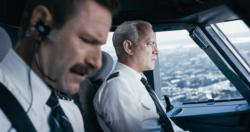
Arron Eckhart and Tom Hanks star in a scene from the movie “Sully.” The Catholic News Service classification is A-III — adults. The Motion Picture Association of America rating is PG-13 — parents strongly cautioned. Some material may be inappropriate for children under 13. (CNS photo/Warner Bros.) See MOVIE-REVIEW-SULLY (EMBARGOED) Sept. 8, 2016.
River gained him instant fame. What emerges is the portrait of a morally deep-rooted and honorable man with a heartfelt concern for those in his charge.
The top 10 family films:
– “Finding Dory,” writer-director Andrew Stanton’s dandy animated sequel to 2003’s “Finding Nemo” sets that film’s trio of main characters (voices of Ellen DeGeneres, Albert Brooks and Hayden Rolence) on another epic journey. Their adventure conveys life lessons about family loyalty, teamwork and the proper balance between courage and caution (A-I – general patronage).
– Director Jon Favreau’s adaptation of British author Rudyard Kipling’s “The Jungle Book” follows the exploits of a “man-cub” (Neel Sethi) raised by animals and offers delightful, good-natured, heartfelt entertainment for the entire family, the most easily frightened tots possibly excepted.
– A captivating animated fable about a Japanese street urchin (voice of Art Parkinson) whose troubled family history launches him on a quest for a magical set of armor, director Travis Knight’s “ ” features rich visuals and deep emotional appeal.

Characters are shown in a scene from the animated movie “Moana.” The Catholic News Service classification is A-II — adults and adolescents. The Motion Picture Association of America rating is PG — parental guidance suggested. Some material may not be suitable for children. (CNS photo/Disney) See MOVIE-REVIEW-MOANA-(EMBARGOED) Nov. 22, 2016.
– The eponymous heroine of Disney’s 56th animated film, “Moana” is a spunky Polynesian princess (voice of Auli’i Cravalho) who joins forces with a demigod (voice of Dwayne Johnson) to vanquish evil. Directors Ron Clements and John Musker’s entertaining romp offers good lessons about family, friendship and the need to be responsible.
– The classic boy-and-his-dog story assumes outsized proportions in the generally warmhearted fantasy adventure “Pete’s Dragon,” a “reimagining” of the 1977 Disney musical. This very tall tale about an orphaned toddler (Levi Alexander) raised by a friendly green dragon is directed at a gentle pace by David Lowery with pleasantly fanciful results.
– A glorious drama that applies the traditional formula of an uplifting sports film to the real-life story of Ugandan chess prodigy Phiona Mutesi (Madina Nalwanga), “Queen of Katwe” – director Mira Nair’s adaptation of Tim Crothers’ book – then goes in unexpected directions. The result is a remarkably inspirational movie.
– Track and field legend Jesse Owens (Stephan James), whose performance at the 1936 Berlin Olympics dealt a devastating blow to Nazism, is the focus of “Race.” Director Stephen Hopkins’ entertaining film provides a valuable history lesson for adolescents as well as their parents (PG-13).– Interstellar derring-do is the order of the day in “Rogue One: A Star Wars Story.” Director Gareth Edwards’ rousing prequel to the 1977 kickoff of the saga stars Felicity Jones, Diego Luna and Alan Tudyk as gallant rebels fighting the evil Empire (PG-13).
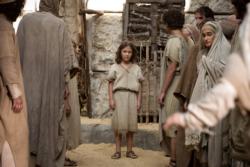
Adam Greaves-Neal stars in a scene from the movie “The Young Messiah.” The Catholic News Service classification is A-II — adults and adolescents. The Motion Picture Association of America rating is PG-13 — parents strongly cautioned. Some material may be inappropriate for children under 13. (CNS photo/Focus) See YOUNG-MESSIAH-(EMBARGOED) March 8, 2016.
– “The Young Messiah,” director and co-writer Cyrus Nowrasteh’s engaging screen version of Anne Rice’s novel “Christ the Lord: Out of Egypt,” remains faithful to Scripture even as it speculates about the childhood of Jesus (Adam Greaves-Neal). This sensitive exploration of the mystery of the Incarnation will intrigue and entertain viewers of most ages (PG-13)
– Anthropomorphism runs amok in the animated comedy-adventure “Zootopia.” Directors Byron Howard and Rich Moore, together with co-director Jared Bush, promote tolerance, hard work and optimism as they tell the story of a rabbit police rookie (voice of Ginnifer Goodwin) and her battle to win the respect of her co-workers.
National and World News
NATION
WASHINGTON (CNS) – Michael Novak, a Catholic philosopher, theologian and author who was highly regarded for his religious scholarship and intellectual independence, died Feb. 17 at his home in Washington. He was 83. His daughter Jana Novak told The Washington Post the cause of death was complications from colon cancer. No funeral arrangements were announced. Since last August, Novak had been a faculty member of The Catholic University of America’s Tim and Steph Busch School of Business and Economics in Washington. He joined the business school’s Arthur and Carlyse Ciocca Center for Principled Entrepreneurship last year as a distinguished visiting fellow. He taught special topics in management and gave a series of lectures on campus on the topic of human ecology.
Novak studied at Catholic University in 1958 and 1959 and had lectured at the university several times prior to last year’s appointment. John Garvey, the university’s president, remembered him as “a man of great intellectual honesty. Unlike some scholars, Michael Novak made it a point to reflect on new and different topics, always with a fresh and dynamic perspective,” Garvey said in a statement. “We are immensely grateful that he could end his academic life as he began it, as a member of our community.”
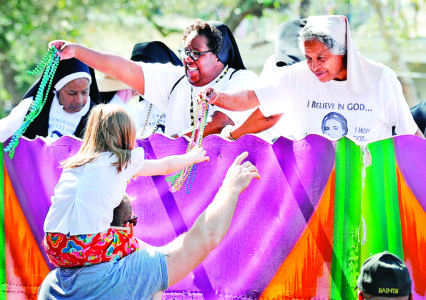
Religious sisters hand beads to a man and child Feb. 19 from the Krewe of Femme Fatale float during a parade in New Orleans. Twenty Sisters of the Holy Family boarded the float, the first time in Mardi Gras history that a women’s religious congregation participated as a group on a Carnival float. Over their habits they wore a T-shirt honoring Mother Henriette Delille, who founded their congregation in 1842. (CNS photo/Christine Bordelon, The Clarion Herald) See NEW-ORLEANS-PARADE-SISTERS Feb. 8, 2017.
NEW ORLEANS (CNS) – For the past 50 years, Patti Gallagher Mansfield has kept the Champion Wiremaster stenographer’s notebook, 5-by-8 inches, safely tucked away among her most cherished, sacred items in her dresser drawer. The notebook has 80 ruled pages. It cost 25 cents. One was given to each of the 25 students from Duquesne University and La Roche College who attended a weekend retreat in February 1967 at The Ark and The Dove Retreat House just outside of Pittsburgh.
Between the slightly faded, tan covers are page after page of Mansfield’s handwritten reflections in blue ballpoint pen of the mysterious things that happened on that three-day retreat, a weekend that ultimately changed the course of the Catholic Church worldwide.
“Who would have ever imagined – 80 pages, Patti Gallagher – that what I would record in this notebook would have any significance to over 120 million Catholics all over the world?” Mansfield, now 70, said. “It is amazing.” The weekend – now called the “Duquesne Weekend” – is acknowledged as the birth of the Catholic Charismatic Renewal movement in the United States, which has spread throughout the world. The Charismatic Renewal centers on the “baptism of the Holy Spirit” in which God’s Spirit renews and fills a person with grace. Mansfield talks about releasing the graces already conferred through baptism and confirmation.
WORLD
VANCOUVER, British Columbia (CNS) – Archbishop J. Michael Miller of Vancouver called on Catholics to respond to a drug overdose crisis that had been sweeping the city, “cutting across every segment of society, devastating families and communities.” In a pastoral letter released Feb. 16, Archbishop Miller said that following Jesus’ teaching would require Catholics to “scrutinize the sign of the times” and, in Vancouver, “these signs are calling the church to address today’s lethal crisis of drug overdoses.” A report released by the British Columbia Coroners Service revealed that 914 people died of illicit drug overdoses in 2016; those statistics prompted the provincial government to declare a public health emergency. That number represented an 80 percent increase in overdose deaths from the previous year. Archbishop Miller said three factors contributed to the overdose crisis: overprescription of opioid painkillers, social isolation and mental illness.
OXFORD, England (CNS) – Church leaders and organizations in Africa, Europe and the United States said it would be disastrous if U.S. President Donald Trump issued an executive order telling companies they no longer had to disclose whether their firms use “conflict minerals” from Congo. Western firms have been accused of working with violent gangs in Congo to obtain minerals used for producing mobile phones, laptops and other consumer objects, and of allowing trade in resources to perpetuate human rights violations.
In the United States, the chairman of the U.S. bishops’ International Policy Committee wrote the acting head of the National Security Council urging Trump not to suspend the rules related to Section 1502 of the Dodd-Frank Act. “Congolese die every day in the illegal mines and at the hands of the armed groups that destroy communities in order to expel them from potential mining sites,” wrote Bishop Oscar Cantu of Las Cruces, New Mexico, committee chairman.
“The estimated death toll in the Congo is the highest since the end of World War II. The international community, including our own nation, nongovernmental agencies and the church, provides emergency assistance to displaced and traumatized persons and families – assistance that has real financial costs that do not appear on the balance sheets of corporations.”
Obispo, defensores oponen al proyecto de ley de “Ciudades Sanctuarias”
Por Maureen Smith
JACKSON – El obispo Joseph Kopacz dio una declaración el miércoles, 15 de febrero, en contra de la SB 2710, conocida como proyecto de ley de “ciudades sanctuarias”. El proyecto de ley prohíbe que las ciudades y las instituciones de educación superiores se declaren “ciudades santuarias”. Actualmente no hay ciudades santuarias en el estado, aunque la ciudad de Jackson propuso tal declaración el año pasado.
“Como cristianos estamos llamados a dar la bienvenida al extranjero y a cuidar a los necesitados. Como ciudadanos, estamos llamados a mantener nuestras comunidades fuertes y seguras. Sentimos que el proyecto de ley, “Ciudades Sanctuarias” (SB 2710) que se debate actualmente en la legislatura de Mississippi daña ambos esfuerzos”, escribió el obispo Kopacz. (Ver la barra en la pagina 2 para la declaración completa)
En una ciudad santuaria, la policía local no estaría obligada a actuar como funcionarios federales de inmigración (ICE). De hecho, estarían prohibidos preguntarle a una persona a la que detuvieron acerca de su estatus migratorio. SB 2710 prohibiría a las ciudades promulgar normas de santuarios. La medida suscita varias preocupaciones.
Su declaración inicial describe a quién se aplicará este proyecto de ley, incluyendo “una agencia estatal, departamento, subdivisión política del estado, condado, municipio, universidad, colegio o cualquier agente, empleado o funcionario del mismo”.
Amelia McGowan, abogada de inmigración del Centro de Recursos para Migrantes de las Caridades Católicas, explicó cómo el lenguaje vago, especialmente en relación con las escuelas, abre una serie de problemas potenciales. “La primera disposición es potencialmente extremadamente peligrosa. Podría permitir que cualquier funcionario estatal, o cualquiera que trabaje para el gobierno estatal, reporte a individuos a las autoridades federales de inmigración. En otras palabras, impide que el estado y las agencias locales de prohibir a sus empleados de reportar a una persona a ICE”, dijo McGowan en un correo electrónico a Mississippi Catholic. “Esto significa que los indocumentados – o indocumentados sospechosos – que buscan servicios en cualquier agencia estatal o local – cortes, protección policial, educación K-12, educación superior, hospital estatal, salud estatal y agencias de salud mental- podrían ser reportados a ICE por un empleado descontento, y esa agencia no podía prohibir a sus empleados hacerlo.
Ahora, presumiblemente, esa persona puede estar protegida en algunos casos por leyes de privacidad, pero temo que esta disposición impida que las personas busquen servicios estatales, que incluyen reportar crímenes violentos a la policía”, continuó.
Según Christy Williams, abogada en la sede nacional de CLINIC, la disposición también abre a los municipios a la responsabilidad potencial. Un empleado de la escuela que revele la información de inmigración de un estudiante podría estar violando las leyes federales de privacidad y la escuela podría ser considerada responsable.
Si un oficial informa a una persona que sospecha que es indocumentada, pero la persona resulta tener un estatus legal válido, la agencia local puede ser demandada. CLINIC destacó un ejemplo de Pennsylvania cuando oficiales arrestaron a un ciudadano estadounidense por presuntos delitos relacionados con drogas.
“Tenía su licencia de conducir y la tarjeta de seguridad social con él y fue finalmente encontrado inocente. Durante su tiempo bajo custodia, la policía llamó a ICE basado en la presunción que, debido a su raza, él era indocumentado. A pesar de estar documentado, el ciudadano fue retenido por 3 días después de publicar la fianza basada en un detenedor de ICE. Fue puesto en libertad sólo después de que un agente ICE lo interrogó y confirmó su ciudadanía. El ciudadano estadounidense demandó a los funcionarios locales en el Corte Federal del 3er Distrito, lo que llevó a veredictos en su favor y costos de asentamiento por un total de $ 150,000.”
La carga no es el único costo potencial. Cuando una agencia local reporta a alguien a ICE, los agentes federales pueden pedir a la agencia local que detenga al sospechoso. La agencia local tiene que absorber el costo de la vivienda, la alimentación y el cuidado de la persona hasta que ICE pueda procesar el caso. Ese dinero rara vez se reembolsa a las agencias estatales y locales.
La vaguedad de este proyecto de ley también podría dañar la relación que los primeros respondedores tienen con sus comunidades. Si los inmigrantes, incluso los que están aquí legalmente, creen que los oficiales de policía, personal médico o bomberos van a denunciarlos a los funcionarios de inmigración, estas poblaciones, ya vulnerables, pueden dudar en pedir ayuda.
“Creo que este proyecto de ley tendría un efecto escalofriante para las personas que buscan servicios como atención médica, atención de salud mental, educación, protección policial, entre otros”, dijo McGowan.
La segunda disposición del SB 2710, que prohíbe las agencias de otorgar el “derecho a la presencia legal” parece innecesario para McGowan. Los agentes federales deben hacer cumplir las leyes federales. Estas son las leyes que se relacionan con el estatus migratorio de una persona para que una agencia local no pueda otorgar tal status. Este proyecto de ley proscribe lo que ya no es legal.
El obispo Kopacz cerró su declaración con una llamada a acción. “Instamos a los legisladores y defensores a oponerse a la SB 2710. Nosotros, como comunidad católica, continuaremos trabajando con inmigrantes y refugiados – dando la bienvenida a sus contribuciones a nuestra comunidad y cultura – mientras oramos por una solución justa a los desafíos de la inmigración y la seguridad.”
Surgery postpones Biloxi ordination for bishop-designate
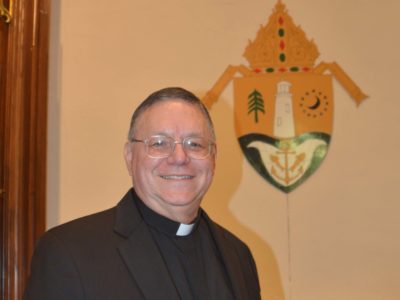 Due to health reasons, the Ordination and Installation of Bishop-designate Louis F. Kihneman as Fourth Bishop of Biloxi has been postponed. A new date for the Ordination and Installation will be announced at a later date.
Due to health reasons, the Ordination and Installation of Bishop-designate Louis F. Kihneman as Fourth Bishop of Biloxi has been postponed. A new date for the Ordination and Installation will be announced at a later date.Louisiana Bishop Herzog retires; Coadjutor Bishop Talley succeeds him
By Catholic News Service
WASHINGTON (CNS) – Pope Francis has accepted the resignation of Bishop Ronald P. Herzog of Alexandria, Louisiana. Coadjutor Bishop David P. Talley of Alexandria succeeds him.
The changes were announced in Washington Feb. 2 by Archbishop Christopher Pierre, apostolic nuncio to the United States.
Bishop Herzog, 74, had headed the 11,108-square-mile diocese in central Louisiana since 2005. Bishop Talley, 66, was named coadjutor of the diocese by Pope Francis last September.
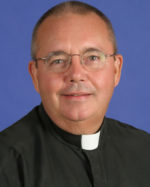
Coadjutor Bishop David P. Talley of Alexandria, La., 66, pictured in a 2010 photo, will succeed Bishop Ronald P. Herzog of Alexandria after Pope Francis accepted the Feb. 2 resignation of Bishop Herzog, who is 74. (CNS photo/Michael Alexander, Georgia Bulletin) See LOUISIANA-BISHOPS Feb. 2, 2017.
When he was appointed coadjutor, Bishop Talley was an auxiliary bishop of the Atlanta Archdiocese, where he was vicar general and director of priest personnel. He was ordained a priest of the archdiocese in 1989.
He became the first native-born Georgian to serve as a bishop in the archdiocese. His episcopal motto is “He will give you a new heart.”
As a priest, he served the archdiocese in several capacities, including as director of vocations, tribunal judge, judicial vicar and chancellor. He also served on the Atlanta Archdiocese’s Hispanic ministry board.
When he was director of vocations, the archdiocese initiated a cross-cultural immersion program for seminarians where they spent time living in El Paso, Texas, and in Juarez, Mexico, to learn Spanish and be more knowledgeable about Hispanic culture and more skilled at ministering in a variety of communities.
One of his roles in the Atlanta Archdiocese was as chaplain to the disabilities ministry. He has said that his experience ministering among people with disabilities, which began at his first parish assignment, is key to his spiritual life.
“All they can do is ask the Lord for help. That simplicity and humility is where I think the church should be – humble before God,” he said in an interview in 2013.
Bishop Talley was raised as a Southern Baptist but has said he left the church as a teenager over the issue of racial segregation. At Auburn University, he met Catholics and read the writings of Trappist Father Thomas Merton, which led him to become a Catholic, he said. He was 24 when he joined the church at St. Mary Church in Opelika, Alabama.
Family members remain faithful Baptists, including a brother who is a deacon. That background gives him a broad view, he said. “I do know faith across the spectrum,” he said.
Born in Columbus, Georgia, Sept. 11, 1950, he pursued seminary studies at St. Meinrad Seminary and School of Theology in Indiana, earning a master of divinity degree. He was ordained a priest for the Atlanta Archdiocese June 3, 1989, at the Cathedral of Christ the King in Atlanta by Archbishop Eugene A. Marino.
His first assignment was as parochial vicar of St. Jude Parish in Sandy Springs, Georgia. He was there until 1993, when he began post-graduate studies at the Pontifical Gregorian University in Rome, where he earned a doctorate in canon law in 1998. In 2001, Pope John Paul II named him a monsignor.
He served other parishes as administrator, pastor and parochial vicar. He last assignment before being named an auxiliary bishop was as pastor of St. Brigid Parish in Johns Creek, Georgia, from 2011 to 2013.
Bishop Talley currently serves as chairman of the U.S. Conference of Catholic Bishops’ Subcommittee on the Catholic Campaign for Human Development, and as a member of USCCB’s Committee on National Collections and its Committee on Ecumenical and Interreligious Affairs.
Born April 22, 1942, in Akron, Ohio, young Ronald Herzog moved with his parents to Natchez, Mississippi, when he was 11 years old. After studies at St. Joseph Seminary in St. Benedict, Louisiana, and at the Pontifical College Josephinum in Worthington, Ohio, he was ordained a priest June 1, 1968, for the then-Diocese of Natchez-Jackson.
He held pastoral posts throughout his priesthood, in addition to having many diocesan responsibilities. He also became a chaplain in the Mississippi National Guard, eventually retiring with the rank of brigadier general.
He became part of the new Biloxi Diocese when it was formed in June 1977. When Bishop Herzog was named to head the Diocese of Alexandria, he became the first priest from the Biloxi Diocese to be named a bishop.
Bishops launch letter campaign urging Trump to protect religious freedom
By Carol Zimmermann
WASHINGTON (CNS) – Saying “religious freedom in America has suffered years of unprecedented erosion,” the U.S. Catholic bishops have posted an online letter for Catholics to send to President Donald Trump urging him to sign an executive order promoting religious freedom.
The letter, found at www.votervoice.net/USCCB/Campaigns, says the president can “restore the federal government’s respect for the religious freedom of individuals and organizations” with an executive order that establishes a “government-wide initiative to respect religious freedom.” Individuals can sign the letter and hit a link to submit it to Trump.
A leaked draft version of a potential religious freedom order was circulating in the media and among federal staff and advocacy groups at the end of January. When White House Press Secretary Sean Spicer was asked about the draft Jan. 30, he said he would not get “ahead of the executive orders that we may or may not issue.” He noted that there have been a lot of executive actions and “a lot of things that the president has talked about and will continue to fulfill, but we have nothing on that front now.”
A White House official told ABC News that the leaked draft on religious freedom is one of hundreds of circulating orders that were either written by the transition team or the White House.
Although Spicer did not elaborate on the leaked document, he told reporters that freedom of religion in the U.S. should mean “people should be able to practice their religion, express their religion, express areas of their faith without reprisal.”
“And I think that pendulum sometimes swings the other way in the name of political correctness,” he added.
The four-page draft has raised concerns among those who said it would legalize discrimination and was too far-reaching, but University of Notre Dame law professor Richard Garnett said in an email to Catholic News Service that the “critics are dramatically overstating” what the order can do.
The draft states that “Americans and their religious organizations will not be coerced by the federal government into participating in activities that violate their consciences.” It also notes that people and organizations do not “forfeit their religious freedom when providing social services, education or health care.” It cites the Religious Freedom Restoration Act, which states that government “shall not substantially burden a person’s exercise of religion” unless that burden “is the least restrictive means to further a compelling governmental interest.”
The U.S. bishops, who have made religious liberty a priority, have not released a statement on potential executive action on religious freedom by Trump but in the online letter available for Catholics to sign stressed such an order should include some of the following measures:
– Relief from the Affordable Care Act’s contraceptive mandate. Currently, the mandate – issued by the federal Department of Health and Human Services as part of the implementation of the health care law – requires most religious employers to provide coverage of artificial birth control for their employees even if the employer is morally opposed to such coverage. There is a very narrow exemption for churches.
– Preservation of tax-exempt status for nonprofit groups that hold beliefs based on marriage and human sexuality.
– The ability of religious organizations that partner with the federal government to act according to their beliefs regarding marriage, human sexuality and the protection of human life at all stages.
– The ability of religiously affiliated child welfare providers to provide adoption, foster or family support services for children that coincide with their religious beliefs.
— Conscience protections about abortion in the individual health insurance market.
(Follow Zimmermann on Twitter: @carolmaczim.)
Advocates stress that U.S. has moral obligation to welcome refugees
By Dennis Sadowski
WASHINGTON (CNS) – Leaders from six organizations want Americans and President Donald Trump to understand that refugees, especially those from war-torn Middle Eastern countries, are average people with careers, comfortable homes and loving families rather than see them as a monolithic threat to the United States.
Their appeal during a Feb. 1 news conference at Casa Italiana at Holy Rosary Church in Washington came as refugees continued to be denied entry into the U.S. nearly a week after Trump ordered a 120-day suspension of the U.S. refugee resettlement program.
Officials of Catholic Charities USA, Migration and Refugee Services of the U.S. Conference of Catholic Bishops, Catholic Legal Immigration Network Inc., Catholic Relief Services, the Association of Catholic Colleges and Universities and the Center for Migration Studies called on Trump to rescind his presidential memorandum implementing the suspension, saying the country has a moral obligation to welcome people fleeing for their lives.
They called the world’s refugee crisis a pro-life issue.
“One of the issues for many of us in this country is that we can’t imagine that the refugee is a person like ourselves, that many of the people that are now caught in camps or horrible situations are people like ourselves who woke up one morning and learned that everything they had was destroyed,” said Dominican Sister Donna Markham, president and CEO of Catholic Charities USA.
“We all have to stop objectifying them. These are human beings like you and I,” she said, recalling the people in northern Iraq she recently contacted via online video communications.
Other leaders cited the country’s long history of welcoming refugees as well as church teaching on welcoming the stranger. They said the U.S. should not relinquish its role as a moral leader in refugee resettlement, especially for those who have been cleared or are awaiting final approval to enter the country. Any delay in their arrival puts them at greater threat, the leaders said.
“These refugees are victims of the same violence that we are trying to protect ourselves from,” said Jill Marie Gerschutz-Bell, senor legislative specialist at Catholic Relief Services, the U.S. bishops’ overseas relief and development agency. “And yet it is American principles, of course, that we are trying to protect. So a disproportionate security response leaves us wondering: What does it mean to be American? What does it mean to be Catholic?”
Welcoming refugees can be an act that not only protects them but also protects U.S. security, said Don Kerwin, executive director of the Center for Migration Studies in New York City. “It’s not really a balance. Refugee protection actually advances and furthers security,” he said.
“That doesn’t mean that there doesn’t have to be careful screening and that there’s responsibilities for improving that screening based on intelligence,” Kerwin added. “Those need to be implemented. But the fact is we have a very, very secure screening process for refugees. It’s more secure than any other admission process for any other category of immigrants.”
Trump’s memorandum, one of three governing immigration issues during the first week of his administration, suspends the entire U.S. refugee resettlement program for 120 days and bans entry of all citizens from seven majority-Muslim countries – Syria, Iraq, Iran, Sudan, Libya, Yemen and Somalia – for 90 days. It also establishes religious criteria for refugees, proposing to give priority to religious minorities over others who may have equally compelling refugee claims.
The resettlement program’s suspension also will affect about 700 employees of Catholic Charities agencies nationwide, with layoffs expected for nearly all of the workers because the stream of refugees has ended, said Sister Markham.
“We absolutely depend on the partnership between public and private funding to support these programs,” she explained. “We don’t have the resources to carry them without that partnership. Four months carrying 700 employees with no income is not feasible for a charitable organization like Catholic Charities.”
The bishops’ MRS department in conjunction with diocesan Catholic Charities agencies resettled about 23,000 of the nearly 85,000 refugees admitted into the U.S. in fiscal year 2016. The majority of them were women and children, said William Canny, MRS executive director.
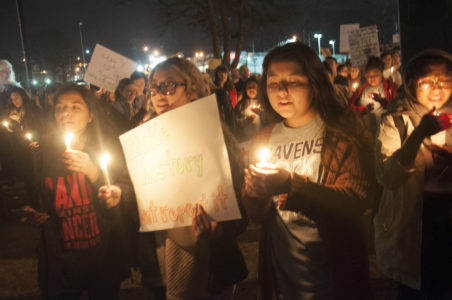
People attend a Feb. 1 vigil sponsored by the Tennessee Immigrant and Refugee Rights Coalition in Nashville in response to President Donald Trump’s Jan. 27 executive order suspending the entry of refugees into the United States for 120 days. (CNS photo/Theresa Laurence, Tennessee Register)
The number of refugees resettled is a small proportion of the 21 million refugees tallied worldwide by the office of the U.N. High Commissioner for Refugees, Canny noted.
He also expressed concern that the resettlement program had enjoyed bipartisan support from Congress and Democratic and Republican White Houses over the years, but that “in the last year or so we saw a breakdown” in such backing.
Trump’s other executive memoranda – one calling for a surge in immigrant detention and deportation and the other setting the stage to build a multibillion dollar 2,000 mile wall along the U.S.-Mexico border – drew criticism from Jean Atkinson, executive director of the Catholic Legal Immigration Network.
An increase in enforcement by federal and local officials “threatens due process and makes our communities and their residents, American and foreign-born, less safe,” Atkinson said. “We’re already seeing men and women afraid to go out into their communities, to go to work, to take their children to school to take them to medical appointments.”
While the organizational leaders pledged to advocate for refugees as long as needed, they also invited Catholics to voice their objection to the president’s actions.
J. Kevin Appleby, senior director of international migration policy at the Center for Migration Studies, said if Catholics mobilized, they could influence the president to change his mind.
“This is a really important moment for Catholics in our country,” he said. “The church is in a particular position to influence this administration I think in positive ways on these issue. Catholics voted for President Trump for various reasons, so they have the ability to convince the administration that they are on the wrong course.”
Pope offers prayers for President Trump
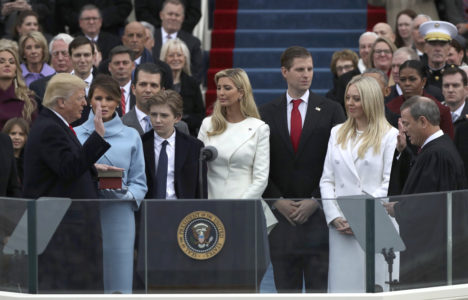
U.S. President Donald Trump places his hand on the Bible as he takes the oath of office administered by U.S. Chief Justice John Roberts Jan. 20. At Trump’s side are his wife, Melania, and children Barron, Donald, Ivanka, Eric and Tiffany during his swearing-in as the country’s 45th president at the U.S. Capitol in Washington. (CNS photo/Carlos Barria, Reuters) See INAUGURATION- Jan. 20, 2017.
By Cindy Wooden
VATICAN CITY (CNS) – As President Donald Trump was being sworn in, Pope Francis told an interviewer it would be “reckless” to pass judgment on the new president before he had a chance to do anything.
“We must wait and see,” the pope told two reporters from the Spanish newspaper El Pais during a 75-minute interview Jan. 19.
The interview was published late Jan. 20 in its original Spanish with an English translation.
Asked if he wasn’t worried at least about some of the things Trump said before his election, the pope responded, “I’m waiting. God waited so long for me, with all my sins.”
“Being afraid or rejoicing beforehand because of something that might happen is, in my view, quite reckless,” the pope said. “We will see. We will see what he does and then we will judge always on the concrete. Christianity either is concrete or it is not Christianity.”
El Pais asked another question about Trump and populists in the United States and Europe who, the interviewer said, “capitalize on fear in the face of an uncertain future in order to form a message full of xenophobia and hatred toward the foreigner.”
“Crises provoke fear, alarm,” the pope said. “In my opinion, the most obvious example of European populism is Germany in 1933. After (Paul von) Hindenburg, after the crisis of 1930, Germany is broken, it needs to get up, to find its identity, a leader, someone capable of restoring its character, and there is a young man named Adolf Hitler who says: ‘I can, I can.'”
“Hitler didn’t steal the power, his people voted for him, and then he destroyed his people,” Pope Francis said.
In times of crisis, he said, large segments of the population think, “Let’s look for a savior who gives us back our identity and let’s defend ourselves with walls, barbed-wire, whatever, from other peoples who may rob us of our identity. And that is a very serious thing.”
Obviously, Pope Francis said, nations have a right and duty to control their borders, especially under the threat of terrorism, but “no country has the right to deprive its citizens of the possibility of talking with their neighbors.”
Bishops mention immigration policy in statement
By Catholic News Service
WASHINGTON (CNS) – Urging Americans to look at their families for stories of immigration, the president and vice president of the U.S. Conference of Catholic Bishops called attention to the hardships and contributions of immigrants to American society as the U.S. church prepared to observe National Migration Week.
Cardinal Daniel N. DiNardo of Galveston-Houston and Archbishop Jose H. Gomez of Los Angeles also said in a Jan. 6 statement that the week is “an opportunity to embrace the important work of continuing to secure the border, to welcome the stranger and serve the most vulnerable” as components of “a humane immigration policy.”
“This year, we are invited to create a culture of encounter where citizens old and new, alongside immigrants recent and long-standing, can share with one another their hopes for a better life,” said the statement marking the observance, which began 25 years ago as a way to reflect on how immigrants and refugees have contributed to the church. “Jesus, Mary and Joseph knew life as refugees, so let us also begin this encounter within our very own families.”
The prelates said migration is “an act of great hope” and those who are forced leave their homelands “suffer devastating family separation and most often face dire economic conditions to the point they cannot maintain a very basic level of living.”
War and persecution force refugees to leave their homelands, they said. They urged Catholics to seek stories from their families about how their parents, grandparents or great-grandparents left their homelands.
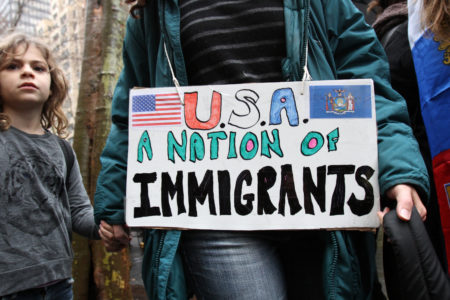
A woman holds a child’s hand as they arrive for a rally in support of immigrants’ rights in New York City Dec. 18, 2016. Cardinal Daniel N. DiNardo of Galveston-Houston and Archbishop Jose H. Gomez of Los Angeles called attention in a Jan. 6 statement the hardships and contributions of immigrants to American society as the U.S. church prepared to observe National Migration Week. (CNS photo/Gregory A. Shemitz) See USCCB-MIGRATION-HOPE Jan. 6, 2017.
“Let us remind ourselves of those moments when our loved ones were forced to seek the mercy of others in a new land,” the statement said.
Though the United States has a great national heritage of welcoming the stranger, “fear and intolerance have occasionally tested that heritage,” the statement said, adding that “whether immigrating from Ireland, Italy or countless other countries, previous generations faced bigotry. Thanks be to God, our nation grew beyond those divisions to find strength in unity and inclusion.”
